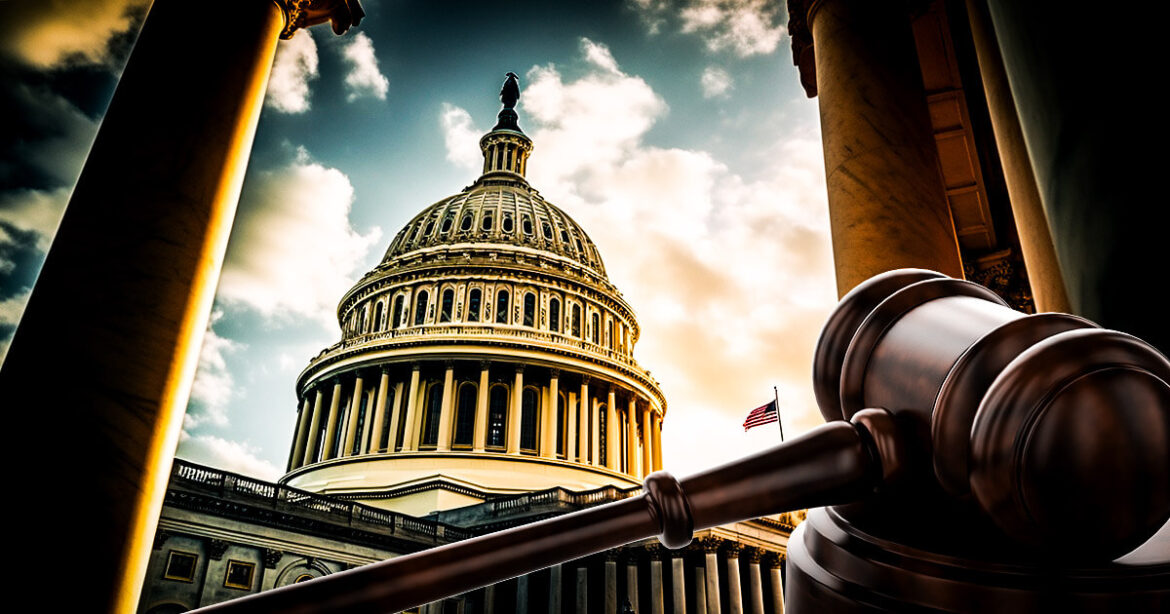 The Wyoming governor, Mark Gordon, recently signed into law a bill that establishes a legal framework for regulating decentralized autonomous organizations under existing financial laws. The enactment of this law is also viewed as an effort to attract blockchain firms to Wyoming. New Law Reinforces Wyoming Crypto-Friendly Reputation Mark Gordon, the Republican governor of Wyoming, […]
The Wyoming governor, Mark Gordon, recently signed into law a bill that establishes a legal framework for regulating decentralized autonomous organizations under existing financial laws. The enactment of this law is also viewed as an effort to attract blockchain firms to Wyoming. New Law Reinforces Wyoming Crypto-Friendly Reputation Mark Gordon, the Republican governor of Wyoming, […]
Source link
legislation
US Treasury Secretary Janet Yellen Urges Congress To Pass Crypto Legislation
In a recent statement before the House of Representatives, US Treasury Department Secretary Janet Yellen emphasized the need for Congress to pass legislation that provides clarity and regulation in the crypto markets.
Secretary Yellen Calls For Action ‘Digital Asset Risks’
During the Financial Committee hearing, Yellen highlighted the “risks” associated with digital assets and called for measures to address potential vulnerabilities and non-compliance with applicable laws and regulations.
Yellen specifically mentioned concerns related to runs on crypto-asset platforms, stablecoins, and the “proliferation” of platforms acting outside regulatory boundaries.
The Treasury Secretary stressed the importance of enforcing existing rules and regulations while urging Congress to enact legislation specifically targeting stablecoins and “non-securities” crypto assets in the spot market.
Notably, Taylor Barr, head of policy at the blockchain trade association Chamber of Digital Commerce, pointed out that the bipartisan FIT for the 21st Century Act, led by Representative French Hill, aligns with Yellen’s call for market structure and regulation.
Hill, a proponent of the legislative environment for crypto, previously highlighted the progress made in the House of Representatives. He emphasized passing the first comprehensive regulatory framework for digital assets and the prudent approach to stablecoins.
Furthermore, Hill believes that these initiatives address significant “regulatory gaps” and contribute to the crypto industry’s growth.
Pro-Crypto Stance And Legislative Initiatives Align
Barr also commended the Clarity for Payment Stablecoins Act proposed by the Chairman of the US Financial Committee, Patrick McHenry.
This act aims to establish consistent oversight and consumer protection for payment stablecoins, incorporating successful state-level regulations and striking a balance between innovation and regulatory certainty.
McHenry, who has been vocal about the importance of the US leading the financial system of the future, has already emphasized the bipartisan progress on legislation to address the regulatory challenges posed by digital assets.
McHenry called for the “completion of the job,” highlighting the Clarity for Payment Stablecoin Act as a crucial step towards establishing a federal framework for stablecoins.
Overall, the convergence of Secretary Yellen’s call for regulation, Representative Hill’s legislative initiatives, and Chairman McHenry’s pro-crypto stance reflect a growing momentum toward establishing a comprehensive regulatory framework for the crypto industry.
However, it remains to be seen how Secretary Yellen’s proposed regulatory enforcement ideas and proposals will strike a balance between fostering innovation, as emphasized by McHenry and Hill while ensuring the growth of nascent technology.
As discussions on crypto legislation continue, the industry eagerly anticipates the outcome, seeking a regulatory environment that provides clarity and consumer protection and positions the United States at the forefront of digital asset innovation.
Featured image from Shutterstock, chart from TradingView.com
Disclaimer: The article is provided for educational purposes only. It does not represent the opinions of NewsBTC on whether to buy, sell or hold any investments and naturally investing carries risks. You are advised to conduct your own research before making any investment decisions. Use information provided on this website entirely at your own risk.
EU set to adopt world’s first AI legislation that will ban facial recognition in public places

The European Union (EU) is leading the race to regulate artificial intelligence (AI). Putting an end to three days of negotiations, the European Council and the European Parliament reached a provisional agreement earlier today on what’s set to become the world’s first comprehensive regulation of AI.
Carme Artigas, the Spanish Secretary of State for digitalization and AI, called the agreement a “historical achievement” in a press release. Artigas said that the rules struck an “extremely delicate balance” between encouraging safe and trustworthy AI innovation and adoption across the EU and protecting the “fundamental rights” of citizens.
The draft legislation—the Artificial Intelligence Act— was first proposed by the European Commission in April 2021. The parliament and EU member states will vote to approve the draft legislation next year, but the rules will not come into effect until 2025.
A risk-based approach to regulating AI
The AI Act is designed using a risk-based approach, where the higher the risk an AI system poses, the more stringent the rules are. To achieve this, the regulation will classify AIs to identify those that pose ‘high-risk.’
The AIs that are deemed to be non-threatening and low-risk will be subject to “very light transparency obligations.” For instance, such AI systems will be required to disclose that their content is AI-generated to enable users to make informed decisions.
For high-risk AIs, the legislation will add a number of obligations and requirements, including:
Human Oversight: The act mandates a human-centered approach, emphasizing clear and effective human oversight mechanisms of high-risk AI systems. This means having humans in the loop, actively monitoring and overseeing the AI system’s operation. Their role includes ensuring the system works as intended, identifying and addressing potential harms or unintended consequences, and ultimately holding responsibility for its decisions and actions.
Transparency and Explainability: Demystifying the inner workings of high-risk AI systems is crucial for building trust and ensuring accountability. Developers must provide clear and accessible information about how their systems make decisions. This includes details on the underlying algorithms, training data, and potential biases that may influence the system’s outputs.
Data Governance: The AI Act emphasizes responsible data practices, aiming to prevent discrimination, bias, and privacy violations. Developers must ensure the data used to train and operate high-risk AI systems is accurate, complete, and representative. Data minimization principles are crucial, collecting only the necessary information for the system’s function and minimizing the risk of misuse or breaches. Furthermore, individuals must have clear rights to access, rectify, and erase their data used in AI systems, empowering them to control their information and ensure its ethical use.
Risk Management: Proactive risk identification and mitigation will become a key requirement for high-risk AIs. Developers must implement robust risk management frameworks that systematically assess potential harms, vulnerabilities, and unintended consequences of their systems.
Senate bill adds to growing list of digital asset legislation moving through Congress

U.S. Senators Mitt Romney (R-UT), Mark R. Warner (D-VA), Mike Rounds (R-SD), and Jack Reed (D-RI) have proposed legislation aimed at sanctioning foreign entities that facilitate financial transactions, including digital asset transactions, with Foreign Terrorist Organizations (FTOs) designated by the U.S.
The bill, titled the Terrorism Financing Prevention Act, is a response to the increasing role of digital assets in financing terrorism, exemplified by Hamas’s recent attacks on Israel. It seeks to expand the Treasury Department’s resources and authority to counteract emerging threats from digital assets and hold foreign financial institutions, including crypto firms, accountable for their relations with FTOs.
The proposed legislation outlines several key measures to prevent FTOs from accessing U.S. financial institutions and digital asset systems. These include the obligation for the Treasury to identify foreign financial institutions and digital asset facilitators that have knowingly conducted significant transactions with FTOs or related parties. Following identification, sanctions would be imposed, either restricting the use of U.S. correspondent bank accounts or barring digital asset transactions with U.S. persons.
The legislation includes two exceptions allowing flexibility on national security issues and trade. A waiver provision enables the Treasury Secretary to suspend sanctions under the Act deemed in U.S. national interest but requires Congressional notification. Additionally, sanction authority excludes the importation of physical goods, avoiding unintentional economic impact. The exceptions permit case-specific sanction waivers benefiting national security and continuous physical goods trade.
Long time coming
Congress is actively considering several bills aimed at regulating the burgeoning cryptocurrency and digital asset market. These legislative efforts reflect a growing concern among lawmakers about the need for a comprehensive framework to govern digital currencies and related activities.
One of the key proposals is the Financial Innovation and Technology (FIT) for the 21st Century Act of 2023, sponsored by Representatives Glenn Thompson (R-PA) and Dusty Johnson (R-SD). This bill seeks to redefine the regulatory boundaries for digital assets by categorizing them based on blockchain technology, distinguishing between centralized and decentralized blockchains.
The bipartisan Responsible Financial Innovation Act of 2023, known as the Lummis-Gillibrand bill, is another major initiative. Introduced by Senators Cynthia Lummis (R-WY) and Kirsten Gillibrand (D-NY), it proposes to maintain the application of the Howey test to digital assets, delineating the oversight roles of the SEC and CFTC in the digital asset market.
The Digital Asset AML Act, reintroduced by Senators Elizabeth Warren (D-MA), Roger Marshall (R-KS), Joe Manchin (D-WV), and Lindsey Graham (R-SC), focuses on extending Anti-Money Laundering (AML) provisions of the Bank Secrecy Act to cryptocurrencies. This bill aims to increase transparency and prevent illicit transactions in the digital currency space.
The Financial Technology Protection Act of 2023, introduced by Senators Ted Budd and Kirsten Gillibrand, is led in the House by Representatives Zach Nunn (R-IA) and Jim Himes (D-CT). This bipartisan bill, previously passed in 2018 and 2019, establishes a group to combat terrorism and illicit financing using financial technologies, including digital assets. It focuses on enhancing anti-money laundering measures and requires annual Congressional reports on its findings and strategies to counteract the misuse of digital assets by foreign entities.
Lastly, the Clarity for Payment Stablecoins Act of 2023, introduced by Representative Patrick McHenry (R-NC), is tailored to regulate the issuance of stablecoins. The bill outlines specific requirements for banks issuing stablecoins, focusing on safeguarding deposits, reserves, and liquidity.
These legislative efforts, coupled with the latest bill submitted on December 7, indicate a concerted effort in Congress to establish clear guidelines and oversight mechanisms for the rapidly evolving digital asset industry. However, given the number of steps that remain for each, any new legislation from Congress is a long way from becoming law.
Coinbase Launches ‘Stand with Crypto’ Campaign to Advocate for Clear Cryptocurrency Legislation in US
The “Stand with Crypto” campaign will have a strategic focus on nine specific states in the United States: New Hampshire, Nevada, Ohio, Pennsylvania, Arizona, California, Georgia, Illinois, and Wisconsin.
The Coinbase “Stand with Crypto” campaign is dedicated to advocating for favorable cryptocurrency legislation in the United States. This initiative follows extensive research by Coinbase, revealing that a majority of Americans believe the financial system requires significant reforms. Among the respondents, 51% contend that the current financial system is unjust, primarily favoring powerful interests over ordinary citizens. The research also indicates that only a small fraction (14%) are optimistic about the future of the existing financial system.
The “Stand with Crypto” campaign will have a strategic focus on nine specific states in the United States: New Hampshire, Nevada, Ohio, Pennsylvania, Arizona, California, Georgia, Illinois, and Wisconsin. Notably, particular attention will be given to the four the “swing states” where voters are less likely to support anti-crypto presidential candidates.
While some elected members of Congress advocate for cryptocurrency regulation and innovation in the financial sector, others prefer maintaining the status quo. Coinbase aims to raise awareness and voice its support for cryptocurrency through this campaign, aligning with the desire for change among many Americans.
“It’s time to challenge the status quo by updating the system,” wrote the company.
Coinbase’s decision to embark on this campaign is substantiated by data from a 2022 fall poll, which revealed that over half (55%) of voters in some targeted states expressed a disinclination to vote for candidates opposing cryptocurrency and Web3. Additionally, during the polling, 13% to 19% of respondents in these states claimed to own cryptocurrencies.
For instance, in Nevada, Ohio, and Pennsylvania, over 40% of cryptocurrency owners use blockchain technology for cross-border money transfers to support individuals’ food, housing, and healthcare expenses. They prefer this method due to its cost-effectiveness and speed compared to traditional bank wire transfers.
Unregulated Crypto Landscape in the US Is a Competitive Disadvantage
The absence of clear regulations poses challenges for cryptocurrency exchanges and businesses in the United States. Even well-established crypto exchanges have faced legal issues and allegations due to the lack of regulatory clarity. Furthermore, many countries are already implementing regulatory frameworks to position themselves strategically in the innovative crypto-driven financial system. Failure to act promptly could result in the United States missing out on attracting innovative companies, creating jobs, and generating additional revenue from the cryptocurrency industry. Coinbase said:
“Crypto needs clear, sensible legislation. The current “enforcement only” approach puts jobs, innovation, and global leadership at risk.”
Some Coinbase’s Strategy for the ‘Stand with Crypto’ Campaign
The “Stand with Crypto” campaign, initiated by Coinbase, is a 14-month-long effort with various programs. It includes “Stand with Crypto Day” in Washington D.C. on September 27, dedicated to promoting cryptocurrency innovation and policy. The campaign also encourages crypto supporters to engage with their Congress Representatives to advocate for favorable and transparent crypto regulations in their respective states.
Coinbase’s approach to achieving its campaign goals involves community rallies, transitioning from social media to phone calls for advocacy aimed at congressional members and influential figures, hosting in-person events, and showcasing how clear cryptocurrency regulations can benefit the financial system and the United States as a whole.
next
Blockchain News, Cryptocurrency News, News

Temitope is a writer with more than four years of experience writing across various niches. He has a special interest in the fintech and blockchain spaces and enjoy writing articles in those areas. He holds bachelor’s and master’s degrees in linguistics. When not writing, he trades forex and plays video games.
You have successfully joined our subscriber list.
Fed Vice Chair Barr gives update on CBDC research, plugs stablecoin legislation

The Federal Reserve Bank vice chairman spoke at the Philadelphia Fed’s fintech event on Sept. 8 about what the central bank’s role is in financial innovation. Research and supervision was the short answer, with a nod to the FedNow Service.
Along with the standard disclaimer about it making no decisions without congressional authorization, Barr provided an overview of the Fed’s “current focus” of central bank digital currency (CBDC) research. He characterized it as “basic research […] that might support a CBDC payments backbone, or for other purposes in the existing payments system.”
Specifically, Barr mentioned system architecture for recording transactions and ownership in ledgers and tokenization models. A FEDS Notes publication the same day on wholesale CBDCs also emphasized that “the technology associated with tokenized platforms is not incompatible with existing central bank money functioning as a settlement asset.”
This payments speech from Michael Barr, vice chair for supervision at the Federal Reserve, features a punctuation mark rarely observed in Fedspeak: an exclamation point! pic.twitter.com/F3GJezrs3N
— Brendan Pedersen (@BrendanPedersen) September 8, 2023
Barr reminded his audience of the Fed’s novel activities supervision program, which it introduced last month. That dedicated team of supervisors can provide feedback that would allow a federally supervised bank to obtain “written supervisory non-objection” to its novel activities involving stablecoins, among other things. Barr said this activity aligns with Office of the Comptroller of the Currency (OCC) policies outlined in interpretative letters 1174 and 1179.
Related: US lawmakers invoke FTX and spar on direction of crypto bills
Strong federal oversight of stablecoins, which is foreseen in the OCC letters, is in the interest of the Fed, Barr said, as a dollar-pegged stablecoin “borrows the trust of the central bank.” He expressed his appreciation for current legislative efforts:
“If non-federally regulated stablecoins were to become a widespread means of payment and store of value, they could pose significant risks to financial stability, monetary policy, and the U.S. payments system.”
The Fed equipped large banks, regional banks, community banks and credit unions with the rails for broadly accessible 24-hour instant payments through the FedNow Service, introduced in July, Barr said. He added that current volumes of the service are small, but it is up to the depository institutions to make the service available.
Magazine: Unstablecoins: Depegging, bank runs and other risks loom
House Financial Services Committee announces ‘Digital Dollar’ hearing as pressure to pass crypto legislation intensifies
The House Finance Committee has announced another hearing on cryptocurrency regulation as demand for congressional action on the virulent industry intensifies.
Held by the Digital Assets, Financial Technology and Inclusion Subcommittee and Entitled “Digital Dollar Dilemma: The Implications of a Central Bank Digital Currency and Private Sector Alternatives,” the hearing will take place at 2:00 PM ET on Thursday, September 14, 2023.
The year 2023 has witnessed a flurry of activity from federal agencies and lawmakers seeking to navigate the rapidly evolving landscape of digital assets. The urgency to implement a cohesive legislative framework has arguably reached a tipping point, spurred by market volatility, investor protection concerns, and the global race to define standards for digital currencies.
Congressional pressure
The cryptocurrency industry has seen increased attention from Capitol Hill this year, with lawmakers on both sides feeling pressure to act.
Leading the charge, Democratic Senator Elizabeth Warren reintroduced the Digital Asset Anti-Money Laundering Act in late July, earning the unexpected backing of Wall Street banks. Aimed at reducing the national security risks posed by cryptocurrencies, the legislation would hold crypto businesses to the same standards and requirements as traditional banks. In a press release, Warren voiced concerns about cryptocurrencies becoming the preferred transaction method among cybercriminals, labeling her bill as the “toughest proposal on the table to crack down on crypto crime.”
The bill, which first appeared in December 2022, is multifaceted. It mandates the likes of crypto wallet providers, miners, and validators to abide by the Bank Secrecy Act, pushing for know-your-customer requirements. The proposed legislation also tasks the Treasury Department, SEC, and CFTC with establishing review processes for crypto businesses, and it directs FinCEN to close regulatory gaps, particularly those surrounding self-custody wallets.
Warren is not the only voice in Congress calling for regulatory clarity. Just two days before Warren’s announcement, the House Financial Services Committee advanced a set of seven crypto-related bills. This Republican-led initiative, which included legislative efforts from Chairman Patrick McHenry, Rep. Warren Davidson, and Rep. Bill Huizenga, addresses various facets of digital asset regulation, from stablecoins to SEC disclosures.
However, the comprehensive package hasn’t been free from criticism. Democratic Representative Maxine Waters pointedly noted that the bill appeared to cater more to the crypto industry’s interests rather than the broader public or the views of other regulatory bodies.
In June, Waters also sought feedback from the SEC and the Treasury Department on the Digital Asset Market Structure Discussion Draft, a Republican-led legislative proposal. This bill, primarily targeting the delineation of a cryptocurrency as a commodity or security, also set out to clearly demarcate regulatory responsibilities.
US lawmakers propose SEC chair consider legislation, not enforcement approach to crypto

Two members of the United States House of Representatives have added their names to a list of lawmakers criticizing Securities and Exchange Commission (SEC) Chair Gary Gensler’s approach to digital asset regulation.
In a letter to Gensler dated July 19, Reps. French Hill and Dusty Johnson suggested legislation was a more effective approach to addressing regulatory issues in the digital asset space rather than the SEC’s position to “regulate by enforcement.” The two lawmakers are the respective chairs of subcommittees in the House Financial Services Committee and House Agriculture Committee that examine digital assets.
“Legislation would do far more to prevent future collapses of digital asset firms than enforcement actions,” said the letter. “A statutory framework would establish a process for firms to come into the regulatory parameter and comply with consumer protections, rather than relying on enforcement actions to punish a bad actor after the damage has already been done.”
The SEC cannot continue to regulate by enforcement. The lawsuits filed against digital asset firms are not protecting the public and are stifling innovation and growth.
My letter to SEC Chair Gensler ⬇️ pic.twitter.com/RjoBNs5YQs
— Rep. Dusty Johnson (@RepDustyJohnson) July 19, 2023
Hill and Johnson hinted at certain actions by the SEC “seemingly timed to coincide with related Congressional activity, which appears calculated for maximum publicity and political impact.” Other members of Congress have questioned Gensler on the timing of the SEC’s charges against former FTX CEO Sam Bankman-Fried, given he had been scheduled to testify before the House Financial Services Committee in December 2022.
Related: SEC’s Gensler offered to serve as an adviser to Binance in 2019, lawyers claim
The two lawmakers also referenced a recent summary judgment affecting crypto regulation, likely referring to an SEC v. Ripple ruling suggesting XRP (XRP) was not necessarily a security. In the wake of the court decision, other House representatives have called on Gensler to reconsider the commission’s current approach to regulating crypto. The SEC chair said he was “disappointed” in the ruling due to its impact on retail investors and the commission would be assessing the situation.
Lawmakers in the House Financial Services Committee are considering a draft market structure bill aimed at clarifying the roles the SEC and Commodity Futures Trading Commission would play in regulating crypto. The bill has yet to be officially introduced and may be amended based on feedback from lawmakers and industry leaders.
Magazine: Crypto regulation: Does SEC Chair Gary Gensler have the final say?
Lummis-Gillibrand crypto bill faces Congress hurdle, yet could shape future legislation
In a tweet on July 13, Justin Slaughter, policy director at research firm Paradigm and a former SEC senior advisor, expressed his opinion on the future of the Lummis-Gillibrand Responsible Financial Innovation Act bill.
He stated, “This bill is less likely to pass than McHenry-Thompson for one simple reason: neither Lummis or Gillibrand lead a Senate committee.”, indicating the bill may not pass the U.S. Congress due to the lack of committee leadership from its sponsors.
The Senators Cynthia Lummis and Kirsten Gillibrand-sponsored bill seeks to provide regulatory clarity for the emerging crypto industry. It grants the Commodity Futures Trading Commission (CFTC) oversight functions over crypto exchanges.
The bill failed to garner much support at its inaugural launch last year and was relaunched on July 12.
Why the bill could fail.
Slaughter explained that every bill in Congress needs the chairman and ranking members’ support in each Committee to determine whether it passes the initial stage.
According to Slaughter, the Lummis-Gillibrand bill faces significant opposition as the chairman of the Senate Banking Committee, Senator Sherrod Brown, previously showed apathy to it. Additionally, other Democrats on the Banking Committee were not particularly warm about its cause.
The former SEC senior adviser noted that even if the bill gets enough support to pass the Committee, it might never get a Senate hearing because of Senator Brown’s opposition. Committee chairs can kill any bill they do not support by failing to bring it up on the Congress floor.
Lummis-Gillibrand bill could still shape crypto legislation.
According to Slaughter, the Lummis-Gillibrand bill could still influence crypto legislation. Key aspects of the bill could be incorporated into another legislative proposal, known as the McHenry-Thompson bill.
Proposed by ranking members of the House Financial Services Committee, the McHenry-Thompson bill aims to clarify the roles of the SEC and CFTC in regulating the cryptocurrency industry.
Slaughter noted that the McHenry-Thompson bill is set for Markup later this month, and Congress members can add as many amendments as possible.
Meanwhile, Slaughter identified about ten parts from the Lummis-Gillibrand bill that should be added to the McHenry-Thompson bill, including the definition of smart contracts, mandatory proof of reserves, CEO attestation, CFTC Funding, criminal penalties for crypto assets crimes, and others.
The post Lummis-Gillibrand crypto bill faces Congress hurdle, yet could shape future legislation appeared first on CryptoSlate.
South Korea prepares further crypto legislation focused on asset issuance, stablecoin regulation
South Korea’s financial authorities are preparing for the second phase of virtual asset legislation to regulate various aspects of the country’s crypto market, local media ChosunBiz reported on June 5.
This second phase of legislation will focus on regulating issues like the issuance of virtual assets, addressing conflicts of interest that might arise during issuance, and establishing a stablecoin regulatory framework.
South Korea’s National Assembly ordered FSC to submit a report on crypto issuance.
Following the passage of the Virtual Asset User Protection Act, South Korean lawmakers ordered the country’s Financial Services Commission (FSC) to submit a report addressing issues of crypto issuance and the conflict of interest “virtual asset operators generate in the process of issuing and distributing” these assets.
Due to this, the financial agency is set to begin a research process focused on resolving these conflicts of interest, regulating stablecoins, and establishing standards for virtual asset evaluation, advisory services, and issuance.
FSC is considering expanding Virtual Asset User Protection Act
Besides that, the FSC is also considering expanding the Virtual Asset User Protection Act through decrees following the issues battling local crypto investment platforms, Delio and Haru.
On June 13, Haru Investments suspended users’ withdrawals due to false information provided by an unnamed consignment operator. The other investment platform, Dellio, paused withdrawals on June 14 due to its exposure to Haru.
Following this incident, South Korean prosecutors have barred these firms’ executives from traveling abroad.
In a July 3 meeting, the FSC reportedly stated that it would consider elaborating the Virtual Asset User Protection Act to cover virtual asset management firms as these companies operate in a grey regulatory area, citing Helio and Daru’s withdrawal issues.
An unnamed official of the FSC said the regulator held discussions with other financial agencies and ministries about this move.
The post South Korea prepares further crypto legislation focused on asset issuance, stablecoin regulation appeared first on CryptoSlate.










